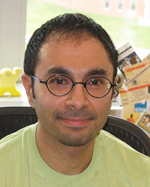非常抱歉,
你要访问的页面不存在,
非常抱歉,
你要访问的页面不存在,
非常抱歉,
你要访问的页面不存在,
验证码:

职称:Associate Professor Research Assistant Professor
所属学校:University of Michigan-Ann Arbor
所属院系:School of Information
所属专业:Informatics
联系方式:734.647.8060
Dr. Kumar's research employs methods in functional genomics and proteomics to investigate important questions in eukaryotic cell / molecular biology. Specifically, he uses the budding yeast Saccharomyces cerevisiae as a model organism to study conserved pathways mediating cell cycle progression and cell polarity establishment. These pathways represent an effective eukaryotic model of signaling networks germane to cancer research, encompassing yeast orthologs of known oncogenes and tumor suppressors. Currently, his research entails a "system-wide" approach to the study of a multi-pathway process wherein strains of budding yeast form invasive filaments called pseudohyphae. As highly similar processes of filament formation are essential to the virulence of many pathogenic fungi, this study holds translational/clinical (as well as basic science) relevance. Additional projects are available in the lab incorporating genomic approaches to the analysis of the eukaryotic cell cycle. Dr. Kumar received his PhD in the biomedical sciences from Wright State University before pursuing postdoctoral training in Michael Snyder's lab at Yale University. While at Yale, Dr. Kumar was a postdoctoral fellow of the American Cancer Society and a Leslie Warner Fellow in cancer research. Since joining the University of Michigan, Dr. Kumar has been named as a Biological Scholar and is a Research Assistant Professor in the Life Sciences Institute.
Dr. Kumar's research employs methods in functional genomics and proteomics to investigate important questions in eukaryotic cell / molecular biology. Specifically, he uses the budding yeast Saccharomyces cerevisiae as a model organism to study conserved pathways mediating cell cycle progression and cell polarity establishment. These pathways represent an effective eukaryotic model of signaling networks germane to cancer research, encompassing yeast orthologs of known oncogenes and tumor suppressors. Currently, his research entails a "system-wide" approach to the study of a multi-pathway process wherein strains of budding yeast form invasive filaments called pseudohyphae. As highly similar processes of filament formation are essential to the virulence of many pathogenic fungi, this study holds translational/clinical (as well as basic science) relevance. Additional projects are available in the lab incorporating genomic approaches to the analysis of the eukaryotic cell cycle. Dr. Kumar received his PhD in the biomedical sciences from Wright State University before pursuing postdoctoral training in Michael Snyder's lab at Yale University. While at Yale, Dr. Kumar was a postdoctoral fellow of the American Cancer Society and a Leslie Warner Fellow in cancer research. Since joining the University of Michigan, Dr. Kumar has been named as a Biological Scholar and is a Research Assistant Professor in the Life Sciences Institute.